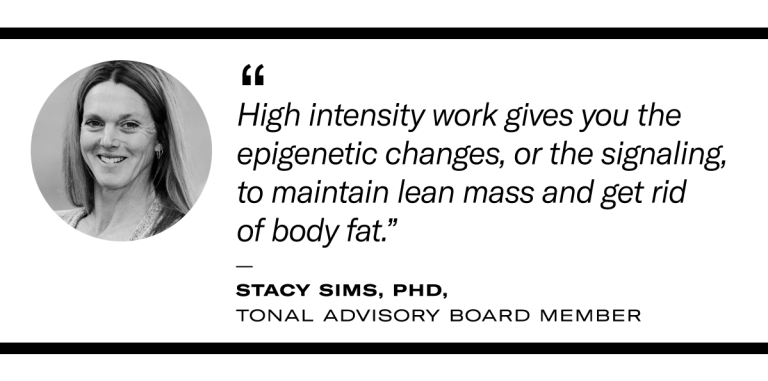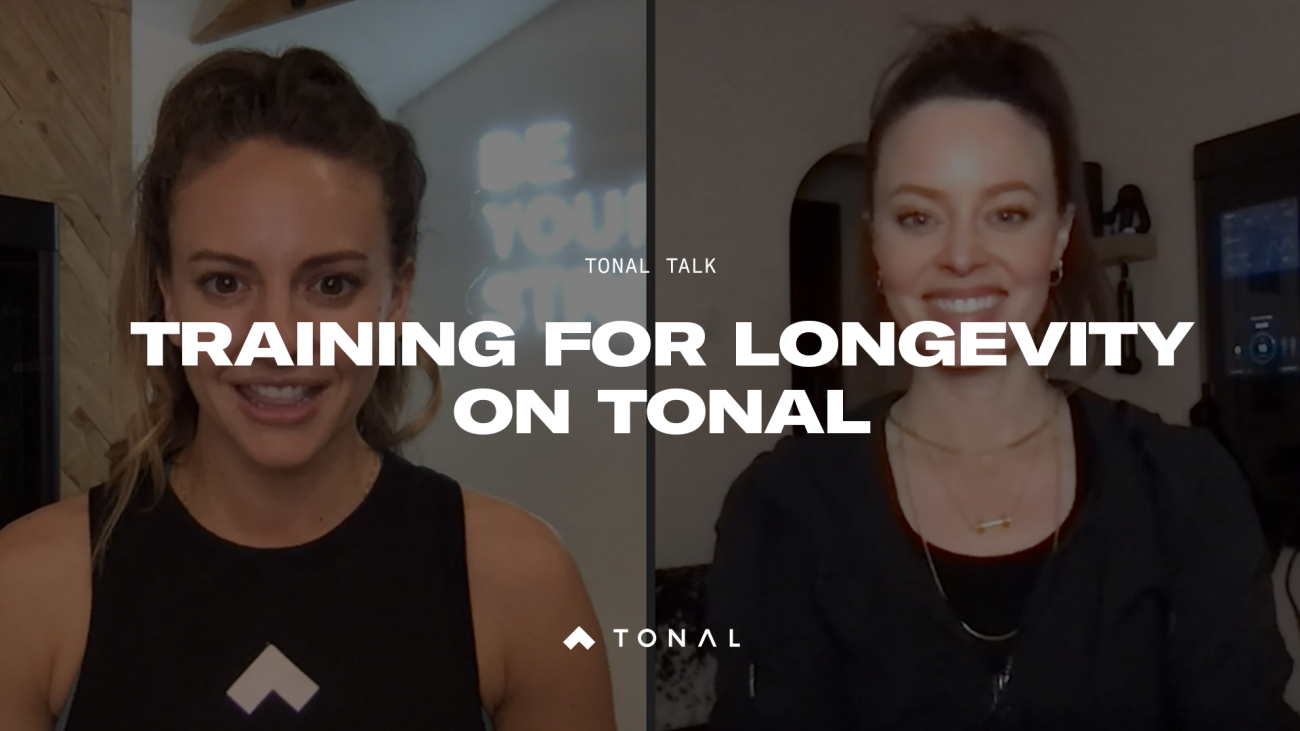Female physiology expert Stacy Sims, PhD, breaks down the unique needs of female athletes.

Although half of the world population is female, the majority of studies on exercise only include men. Female physiology expert and Tonal Advisory Board member Stacy Sims , PhD, is working to close that gap.
Sims is at the forefront of research on women and exercise , shedding light on how the menstrual cycle affects training and the best ways for peri- and post-menopausal women to stay strong as they age.
In a recent Tonal Talk, Sims sat down with Tonal Senior Community Manager Kate Telge to answer members’ questions about nutrition and exercise for women. Watch the video for the full interview, and check out these five key takeaways that’ll help you train smarter and achieve your goals.
1. Prioritize High-Intensity Training
Fluctuating levels of hormones during perimenopause, which most women experience in their 40s, make it harder to maintain lean muscle mass. Since this often coincides with busy years full of career and family demands, it’s critical to do the right kind of training in what limited time you have.
“This is where people get overwhelmed with the idea of having to set aside 30 or 40 minutes,” says Sims. “But we know that, especially in the 40s, short bursts of high intensity is the best thing you can do.” In just a few minutes, this type of training improves cardiovascular fitness and metabolic control. “High-intensity work gives you the epigenetic changes, or the signaling, to maintain lean mass and get rid of body fat,” says Sims.
Once you lock in those high-intensity sessions, start adding resistance training. “It doesn’t have to be an hour,” says Sims. “It can be 20 minutes of really heavy, focused work—low volume and high intensity.” She explains that this type of training is sufficient stress to build lean muscle and lose body fat.

2. Fuel Your Workouts With Protein and Carbs
“If you exercise on purpose, you’re an athlete,” Sims says.
Elite athletes time their meals to maximize the results of their workouts, and you can do the same. “The goal is making sure you have nutrition coming in around your training,” she adds. She recommends a snack with a small amount of protein before your workout and a meal with plenty of protein afterward. Eating regularly alerts the brain that it can handle and adapt to the upcoming stress of your workout.
Sims doesn’t think it’s necessary to track macronutrients , though. “When we start getting down to nutrient science, we become so focused on that, and we forget about the whole food aspect.” Instead, prioritize eating high-quality carbohydrates from fruits, vegetables, and whole grains, along with protein in all of your meals.
Sims explains that amino acids in protein support the immune system, brain and gut health, lean mass development, and signal to the body that it doesn’t have to hold on to as much fat. “If you don’t give your body food, it’s not going to be stress-resilient and you’re not going to lose the weight,” she says. For peri- and post-menopausal women who want a small calorie deficit, she suggests cutting 150 to 200 calories in the evening, so your body always has enough energy during the day.
3. Stick to High-Quality Supplements
For the most part, Sims recommends getting your nutrients from real food. If you do want to supplement, it’s important to look for high quality products. With protein powders and shakes , for example, she prefers whey protein isolate (instead of concentrate) which offers the highest percentage of protein without fillers. To see what brands and products meet these requirements, check the NSF website for their list of certified supplements.
Be wary of pre-workout supplements or “fat burners” advertised to give you energy during your workout, Sims advises. “Fat burners aren’t fat burners. They’re things that increase your sympathetic drive, like caffeine and taurine. Increasing sympathetic drive—that fight or flight response—is not a way to burn fat. It’s a way to burn out.”
She explains that these supplements increase cortisol, which, in women, can promote fat gain. Instead of getting amped up, get adequate sleep to recover from intense training. Sleep is one of the biggest factors affecting fat loss in women, Sims says.
If you’re looking for a little boost pre-workout, she recommends a beta-alanine supplement or beet juice. Both are vasodilators , which can reduce blood pressure and delay fatigue. A small dose of caffeine works, too, if you know your body responds well to it.
4. Reconsider Intermittent Fasting
You might’ve heard about the intermittent fasting trend, but Sims doesn’t buy into it. “All the health benefits of fasting come from a clinical population that doesn’t exercise,” she says, explaining that the research doesn’t apply to active people — and definitely not active women.
Women require 35 to 40 calories per kilogram of lean body mass each day to maintain normal hormone function. For men, this number is only 15 calories per kilogram of lean body mass. “When your brain starts perceiving there aren’t enough calories coming in, it downturns two areas called the kisspeptin neurons, which are responsible for appetite and endocrine function,” she says. After a few days of not meeting this calorie threshold, you’ll start experiencing thyroid and menstrual cycle disruption. These hormones signal to the body that it’s in a catabolic state and should break down muscle tissue. Exercising exacerbates this negative effect by putting even more stress on the body.
While non-exercisers in the fasting studies did experience metabolic benefits like more effective carbohydrate breakdown and increased insulin sensitivity, Sims says you’ll get the same—if not better—results from exercising while well-fueled.
5. Don’t Stress About Performance and Your Menstrual Cycle
Tracking your cycle is beneficial to know when your body can handle heavier loads and more stress, but you can perform at a high level at any time as long as you’re properly trained. Sims’ work explores how women can use hormonal fluctuations to their advantage in training, but she says this matters less when it comes to performance, like in a key race or competition.
“There’s a difference between training with your cycle and performance,” she says. “There is never a negative day in your cycle for performance. The psychological supersedes the physiological when we’re talking about one point in time for performance.” That means you can still crush a marathon that’s scheduled four days before your period even if that’s a week when you usually take it easy.
Editor’s Note: This interview has been edited and condensed for clarity. Tonal Talk is a biweekly Facebook Live interview series highlighting stories of real strength from within the Tonal community.
More Tonal Talks


